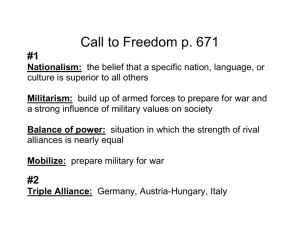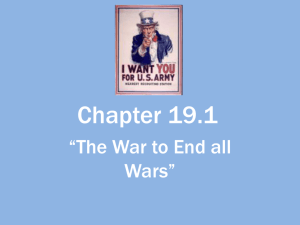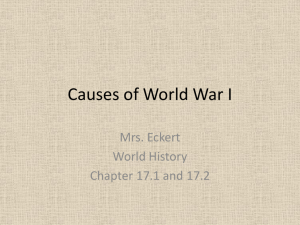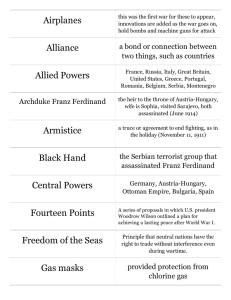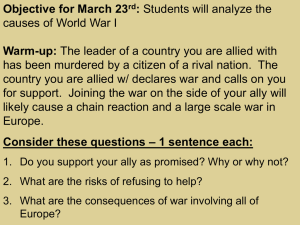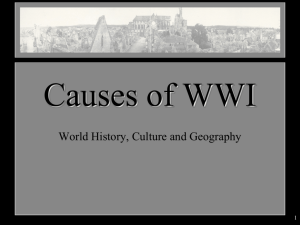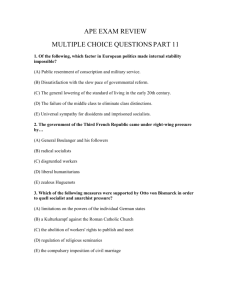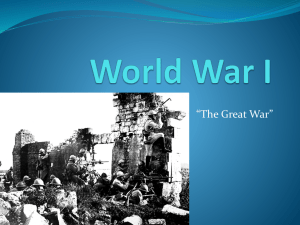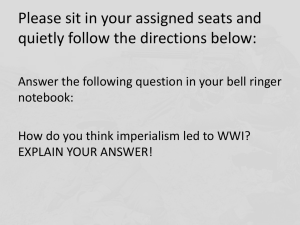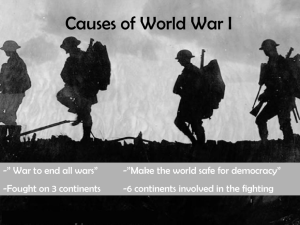The Great War
advertisement
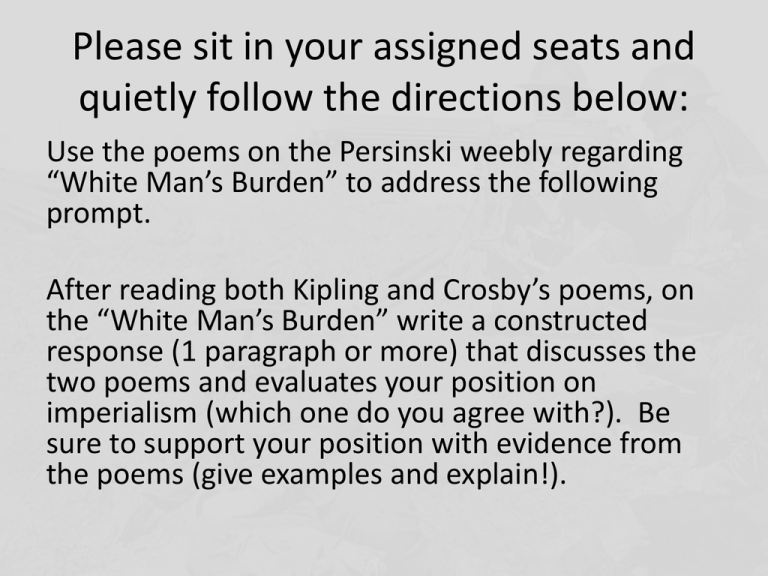
Please sit in your assigned seats and quietly follow the directions below: Use the poems on the Persinski weebly regarding “White Man’s Burden” to address the following prompt. After reading both Kipling and Crosby’s poems, on the “White Man’s Burden” write a constructed response (1 paragraph or more) that discusses the two poems and evaluates your position on imperialism (which one do you agree with?). Be sure to support your position with evidence from the poems (give examples and explain!). USHC Standard 5: The student will demonstrate an understanding of domestic and foreign developments that contributed to the emergence of the United States as a world power in the twentieth century. USHC 5.4: Analyze the causes and consequences of United States involvement in WWI, including the failure of neutrality and the reasons for the declaration of war, the role of propaganda in creating a unified war effort, the limitation of individual liberties, and Woodrow Wilson’s leadership in the Treaty of Versailles and the creation of the League of Nations. WWI Created by Mrs. Magyar! Ed by Persinski! President Woodrow Wilson (1913-1921): • an anti-imperialist • believed democracy was essential to a nation’s stability and prosperity • believed that the U.S. should promote democracy in order to ensure a peaceful world free of revolution and war Despite 40+ years of peace, tensions among European nations were building in 1914 There were several causes of World War I: 1. Alliances - Germany became one of the most powerful nations in the world, and changed European politics • The (G) Prussians fought and defeated France, and forced them to give up land along the German border • Germany signed alliances with Italy and Austria-Hungary, creating the Triple Alliance • Russia and France had a common interest in opposing Germany and Austria-Hungary • They signed the Franco-Russian Alliance German Kingdom of Prussia 2. The Naval Race/Militarism • Germany began to build a navy, challenging Great Britain’s historical dominance of the sea • By the early 1900’s, an arms race had begun between Great Britain and Germany • This arms race increased tensions between Great Britain and Germany, bringing Britain closer to France and Russia • Great Britain refused to sign a formal alliance—WHY? • Their new relationship with France and Russia became known as “entente cordiale”, or a friendly understanding. • Great Britain, France and Russia became known as the Triple Entente 3. The Balkans Crisis/Nationalism • Nationalism was a powerful idea in Europe in the late 1800’s • Many people were willing to go to war to expand their nation at the expense of others • Self-determination: the idea that people who belong to a nation should have their own country and government • Groups within the region known as the Balkans began to press for independence from the Ottoman Empire and the Austria-Hungary Empire because of nationalism • The people in this region were known as Slavs; Russia supported Serbia, because they were a rival of AustriaHungary and had the same ethnic background as Serbia (Slavic) The Balkans 4. IMMEDIATE CAUSE: The Assassination of Archduke Franz Ferdinand • In June of 1914 the heir to the AustriaHungary throne, Archduke Franz Ferdinand, visited the Bosnian capital Sarajevo • A Bosnian revolutionary, Gavrilo Princip, shot Ferdinand and his wife to death • On July 28, 1914 Austria-Hungary declared war on Serbia • This caused the European alliances to mobilize 4. The Assassination of Archduke Franz Ferdinand • Russia mobilized its army, including troops stationed on the German border • On August 1, 1914 Germany declared war on Russia • Two days later, Germany declared war on France Those fighting for the Triple Entente-France, Russia, Great Britain and Italy-were called the Allies Those fighting for the Triple Alliance-Germany, Austria-Hungary, The Ottoman Empire and Bulgaria-were called the Central Powers 4. The Assassination of Archduke Franz Ferdinand • In June of 1914 the heir to the Austria-Hungary throne, Archduke Franz Ferdinand, visited the Bosnian capital to show Austrian strength. • A Bosnian revolutionary, Gavrilo Princip shot Ferdinand and his wife. • On July 28, 1914 Austria-Hungary declared war on Serbia. • This caused the European alliances to mobilize. Russia declared war on Austria-Hungary. Germany backed up Austria-Hungary and attacked France etc etc. Create a diagram illustrating the Which side is the “good” alliance system. side? Which side is the “bad” side? Why? In other words, who is “right” and who is “wrong”? WWI Triple Alliance aka Central Powers ? ? Entente ? ? U.S. Position? Why? ? ?
